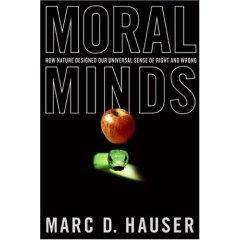Short Fuse: The Question of ‘Moral Minds’
By Harvey Blume
Short Fuse and the Arts Fuse will continue to follow and comment on this story. We welcome your thoughts as well. Updates on the Marc Hauser story here, here, and, here. And now more — here and here. The latest here
 As of August 12, 2010, Marc Hauser has taken a year leave from his position as Professor of Psychology at Harvard University pending investigation into his research. I, for one, remain intrigued by his attempt to prove his theories about our elemental moral makeup but am not completely surprised by this turn of events.
As of August 12, 2010, Marc Hauser has taken a year leave from his position as Professor of Psychology at Harvard University pending investigation into his research. I, for one, remain intrigued by his attempt to prove his theories about our elemental moral makeup but am not completely surprised by this turn of events.
Hauser made groundbreaking claims in his work at Harvard. He aimed to do for morality what Noam Chomsky had, decades ago, done for language, namely to show that humans come equipped with a deep moral grammar that can be expressed in any number of particular ethical systems just as we come with a deep linguistic grammar that underlies innumerable languages. Hauser wanted to lay bare, by experimental method, the core elements of our moral grammar. Further, he wanted to show that these elements, or their antecedents, could be found, in primitive form, in the behavior of primates and monkeys.
I am sympathetic to these claims, not least of all for political reasons. We don’t need religion to have language. We don’t need gods to talk. Nobody could sanely argue otherwise. Hauser was attempting to demonstrate that, whatever the religious right maintains, neither do we need religion in order to have morality, and that, in fact, humans as a species can no more lack morality than we can lack speech. Once communities form, so do moral systems.
I buy that hypothesis on a gut level and was looking forward to it being proved. However, some of the basic findings Hauser used in his work turned out to be suspect. I was skeptical about the arguments in his book, Moral Minds: How Nature Designed Our Universal Sense Of Right And Wrong. It was filled with disproportionately ambitious claims and—not to put too fine a point on it—boasts, as in too often repeated claims that the book would make him the Chomsky of morality. Hauser had worked with Chomsky on several papers, and his claims about morality were deeply influenced by Chomsky’s ideas about language. Yet the latter’s work is not remembered for its presumption but for its paradigm changing arguments.
Now, it turns out Hauser’s peers refuse to corroborate his findings or maintain that he has falsified their responses.
What do I make of this? First, that I sensed something. Scientists shouldn’t be so ready to crow, and normally, aren’t. That doesn’t mean that Hauser was necessarily wrong in his surmise that parallels can be established between linguistic and moral grammar. In fact, I suspect he’s right and wish he hadn’t been tempted to overreach and/or falsify his findings.
This episode, still unfolding, does not debunk the scientific method. Quite the opposite: Hauser was confronted and caught. (Harvard is being challenged by students not to bury the details of this investigation.) Meanwhile, his hypothesis remains viable and the research will continue.
